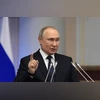By Daniel Flatley, Jennifer Jacobs and Viktoria Dendrinou
The US targeted banks that facilitate payments for Russia’s military-industrial complex, the latest in a series of restrictions that have tried — and so far failed — to cripple President Vladimir Putin’s ability to fund his invasion of Ukraine.
The US targeted banks that facilitate payments for Russia’s military-industrial complex, the latest in a series of restrictions that have tried — and so far failed — to cripple President Vladimir Putin’s ability to fund his invasion of Ukraine.
President Joe Biden was set to amend two executive orders Friday in a move that will for the first time allow the US to impose so-called secondary sanctions over the Ukraine war, opening the door to financial penalties on banks for doing business with firms already sanctioned for their links to Russia, whether they know it or not.
Deputy Treasury Secretary Wally Adeyemo said the measures give the US the ability to target the financial institutions directly in cases where officials don’t get cooperation from foreign governments on enforcing sanctions.
“They’re not going through big companies in these countries,” Adeyemo said in an interview on CNBC. “They’re going through small firms to get things like micro electronics, and machine tools and engine parts. But all of these companies still have to use the financial system. What this executive order gives us the ability to do is to target smaller institutions that may be unwilling to or wittingly trying to get around our sanctions.”
The move may cause fresh headaches for some US banks, which have already erected expensive compliance protocols to ensure they don’t run afoul of sanctions. While many international banks no longer do business directly with Russia, they can act as correspondent banks for financial institutions in third countries that continue to finance the trade.
Under Friday’s action, some of those banks could face penalties for maintaining those relationships if the trade continues.
“We expect financial institutions will undertake every effort to ensure that they are not witting or unwitting facilitators of circumvention and evasion,” Treasury Secretary Janet Yellen said in a statement.
US officials will work with American and European banks over the next several weeks to tell them about the order and warn that they must take steps to prevent themselves from running afoul of the policy.
Also Read
The move also reflects the challenge faced by US officials, who so far haven’t been able to keep Putin’s military from procuring the equipment it needs — even after the US and its allies imposed one of the most restrictive sanctions regimes in history.
The Kremlin has found ways to get around western sanctions by using financial intermediaries to help obtain critical components for the war. It’s also managed to circumvent sanctions on the oil trade through a shadow fleet of tankers that transport illicit Russian oil.
Eddie Fishman, a senior research scholar at Columbia University’s Center for Global Energy Policy, said the move was long overdue and puts banks and companies around the world “on notice.” However, he also pointed out that the effectiveness of the new policy will depend on how aggressively the Biden administration enforces it.
“Secondary sanctions of this nature have their limits,” Fishman said in a post on X. “Compliance will not be airtight.”
The allied effort has become even more urgent as political clashes have derailed efforts to replenish Ukrainian weapons stockpiles, which could severely hamper the country’s ability to repel the Russian invasion. US lawmakers abandoned efforts to reach a deal before their holiday recess to provide more than $60 billion in new assistance for Ukraine.
The allied effort has become even more urgent as political clashes have derailed efforts to replenish Ukrainian weapons stockpiles, which could severely hamper the country’s ability to repel the Russian invasion. US lawmakers abandoned efforts to reach a deal before their holiday recess to provide more than $60 billion in new assistance for Ukraine.
European Union leaders earlier this week backed a sanctions package that cracks down on Russia’s lucrative diamond industry, prohibits import of liquefied petroleum gas from Russia, restricts import of some processed metals and bans the export of machine tools and machinery parts Russia uses to make weapons targeting Ukraine.
Under the terms of the executive order, the Treasury Department will have the ability to go after US and European banks who have relationships with foreign financial institutions facilitating the trade in certain high-value components, including semiconductors, machine tools, chemical precursors, ball bearings and optical systems.
The order will give US authorities the ability to implement bans on products that originated in Russia but were substantially transformed outside of Russia. The US has already banned the import of Russian diamonds and the new order will ensure that even if Russia ships diamonds to another country for processing, those cannot enter the United States.
The order will give US authorities the ability to implement bans on products that originated in Russia but were substantially transformed outside of Russia. The US has already banned the import of Russian diamonds and the new order will ensure that even if Russia ships diamonds to another country for processing, those cannot enter the United States.
)